Ryan Sheely: Hey Jordan, I hear you’ve been watching a lot of Thomas the Tank Engine lately and have some thoughts on it. What’s been on your mind as you’ve een watching it with your 1.5 year-old (or on your own, long after your son has gone to bed)?
Jordan Stokes: So. Much.
I was thinking of writing a post about this called “Scenes from the Class Struggle on Sodor”. Look, the basic plot of Thomas and Friends works like this: one of the trains — let’s just say it’s James — gets an important assignment. “A very special special,” as they like to say. Then James screws his mission up. (There’s not a lot of consistency in the characterization, here, but some of the engines have habitual vices. James is vain, Gordon is proud, etc.) The Fat Controller yells at James for causing “confusion and delay,” and James feels terrible about not being “a Really Useful Engine.” James hustles around to fix whatever problem he caused. The Fat Controller says “Hurrah for James!” And then everybody learns a valuable lesson.
It’s the “Really Useful Engine” thing that gets me. The trains have an almost fetishistic attachment to being useful. They want SO MUCH to do their jobs well. Mind you, they aren’t paid. But what they’re doing is recognizably work.
Now, wanting to be Really Useful is rational. There’s a scene in the movie Hero of the Rails where we learn that engines who aren’t really useful are MELTED DOWN FOR SCRAP.
But this isn’t why the engines usually want to be Really Useful. They do it because it fills a psychological need, and more particularly because they want to make the Fat Controller happy.
So I have two questions: 1) What would Karl Marx say about all of this? 2) What kind of lessons is this show teaching our children about work?
That’s the core of it. There’s a lot of other peripheral stuff, though.
- Why would Sir Toppham trust any of the engines to do anything? They screw up every assignment they’re given.
- Why do the diesels have working class accents?
- How many train lines can this island possibly support? Sodor must be hemorrhaging tax dollars.
David Shechner: F***ing Diesel 10, amirite? Yeah, the only thoughts I have on TtTE that are of any potential consequence are:
- When you have sentient vehicles, then what exactly is the point of having engineers/drivers/etc? Are they basically just there to load coal into the boiler? And if so, couldn’t you have developed an automated system for that, too, while you were developing sentient trains?
- Seriously, is Sir Toppum Hat’s official title, “The Fat Controller?” Or, is everyone just happy casually insulting his weight?
- Sodor is a Socialist dystopia in which all sentient beings are defined and chiefly characterized by their profession. For vehicles, this is determined before birth.
- The Hiro character is a gleaming example of the kind of casual racism that’s permissible in the UK but eschewed over here. Unless you’re Michael Bay, in which case that kind of casual racism is cool over here, too.
- How many f***ing times does Gordon have to be taught the lesson of humility? Now that I think of it, his difficulties getting up his eponymous hill have a vaguely Sisyphusian air to them.
- I bet Emily’s kinda a freak in the sack.
Matt Wrather: This is low hanging fruit, but wouldn’t Marx insist that the engines have false consciousness? Their concern with usefulness as an existential position, as a psychological imperative, obscures the true economic nature of the relations among the various parties, and the disposition of capital that enables the injustice?
Stokes: Right, something along those lines. But that only raises further questions.
- What IS the true economic nature of the relations among the various parties in question?
- To what extent is Thomas & Friends instilling false consciousness in the viewer, with regard to the true nature of real-world economic relations? (This is part of question 2, above.)
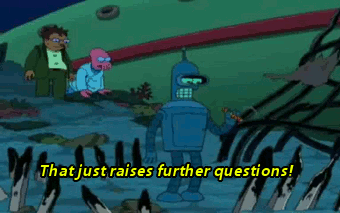
The obvious answer to a) is, well, slavery. The engines are bought and sold like property. (This rarely comes up, but every now and then it’s mentioned, usually as a way of introducing a new character.) They have to do whatever Sir Toppham asks them to do, and they only get room and board in exchange (to the extent that they’re paid at all). And again, as noted above, Toppham has the power of life and death over them: he can melt them down for scrap if he chooses, or inflict more baroque punishments. If you go back to the early episodes of Thomas and Friends, which are a lot wilder and woolier — and, as it happens, based more directly on the books — this sort of thing actually happens. For instance, there’s an episode where Henry the Hypochondriac Engine refuses to come out of a tunnel because he’s worried about the rain spoiling his paint. Toppham responds by bricking him up in the tunnel.
Ostensibly forever. I mean, sure, they end up letting him out in the next episode. Still, this is an Edgar Allen Poe solution to a Reverend W. Awdry problem. (Even though Awdry wrote the solution himself.)
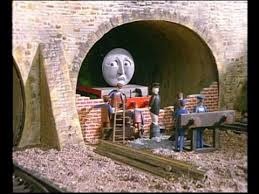
“For the love of God, Fat Controller!”
But the fact that Awdry’s Toppham sometimes goes all old-testament on the engines — and the fact that Awdry as always billed as a Reverend — points to the other possible answer to a): Sir Toppham Hatt is God, and the engines are his worshippers. Of course, they aren’t his creation, not specifically his, but machines are more generally the creations of man. And the attitude of joyfully obedient service that the engines have towards Toppham is pretty close to the attitude that Christians are meant to have towards Christ. (So once again: “Yes, for the love of God!”) It’s not so strange to think that machines — actual train engines, for instance — have a teleological duty to be Really Useful to humans, who after all are a higher order of being.
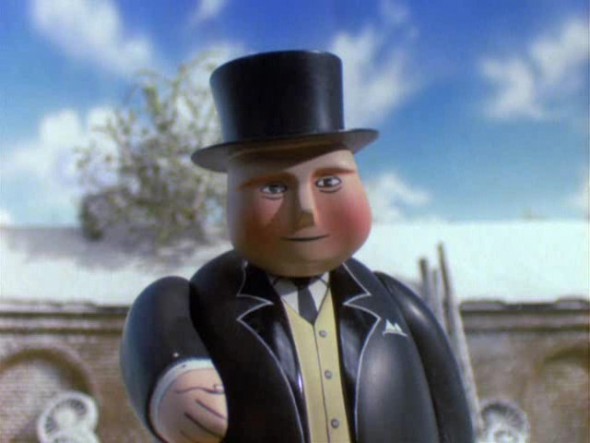
“Yes,” Toppham said, “for the love of God! And stop calling me fat!”
But that’s impressively messed up when it comes to b), above. Because if we map this onto real-world labor relations, Sir Toppham Hatt is basically just the 1%. He’s a combination of the government and your boss’s boss’s boss. The idea that you should, basically, worship this guy — that he always knows what’s best, that you are worthless as a person if you aren’t actively making him happy at all times — strikes me as dodgy. It’s interesting, in this regard, that Sir Toppham is clearly meant to look like Winston Churchill. (He even has a little rail car named Winston, in case the connection wasn’t clear.) This is apparently the government figure that most English people feel most comfortable equating with God? (The U.S. equivalent would probably be Abe Lincoln.)
Pushing further on the labor front: It’s not as if mapping events in the Thomasverse onto real-world labor relations is such a wild idea. There’s another early episode where three of the big engines – Gordon, James, and Henry – go on strike for better working conditions. (It’s explicitly flagged as a strike in the narration.) Both the strikers’s demands and the management response are illuminating.
But before we get into that, I probably need to explain a thing or two about steam locomotives.
Gordon, James, and Henry are tender engines. This means that they have a separate car, called a tender, which carries their coal and water. (The engine car itself contains only the engine.) Thomas the Tank Engine is, surprisingly enough, a tank engine, which means that he has internal compartments for coal and water. Tender engines are generally more powerful, and can run for longer without refueling. However, they can’t go backwards at high speed: the tender mechanism would break down if you tried this. So at the end of the line, they always have to be turned on a turntable. Tank engines are more maneuverable, because they can reverse at high speed, but they have to be refueled more frequently. (Overthinking It: your internet source for the best, illest facts about obsolete trains.)
In the episodes leading up to the strike, we see a labor peace – i.e. a stable equilibrium of labor relations – disrupted by a crisis. In the state of equilibrium, there is a division of labor between the tender engines and the tank engines (or really the tank engine, because it’s just Thomas): the big engines pull trains on long runs between stations, while Thomas’s job is “shunting,” which is apparently the term of art for tootling around the train yards to assemble the train one car at a time. Shunting involves a lot of switching between forwards and reverse, and so it would seem like tank engines are better suited for it. (I haven’t looked into this, but Awdry was apparently a GIANT DORK about trains, so I’m guessing this reflects actual practice.)
The crisis comes when Thomas is given a regular assignment pulling a small passenger train on a new branch line. Since he’s too busy for shunting, the tender engines are forced to shunt their own cars – a task that they feel is beneath their dignity. What’s more, they have serious difficulties using the turntable: either it won’t turn at all, or it turns too quickly and sends them flying. (Just like in real life, when a company increases capacity without increasing staffing, it can cause real problems, not just for morale but for quality-of-service, and in many industries for safety as well).
So anyway, three of the tender engines go on strike. They aren’t demanding higher wages (since they’re not paid in any case), or better job security (because – and this is a really interesting point – the Thomasverse is a fantasy labor market in which there is always enough work for everyone to do, and nobody is ever fired for incompetence). They’re refusing to do any more shunting – and this isn’t presented as a complaint about the ineffective and hazardous turntable system (which would make it a legitimate grievance), but as a matter of preserving a privileged division of labor. Imagine if the tenured faculty at some university went on strike because they didn’t want to grade midterms.
The results of the strike are mixed. The Fat Controller recognizes that he needs to expand his labor force, and he buys another tank engine, Percy, to address the problem. But this isn’t presented as a victory for organized labor! Rather, it’s meant to demonstrate the beneficience and wisdom of the Fat Controller’s leadership. The striking engines are imprisoned, shut up in the train sheds and “left cold, lonely, and miserable” until they finally “realise just how silly they have been.” In the meantime, Toppham has the tank engines Thomas and Percy run the railway along with Edward, a tender engine who chose not to strike. “While there are fewer trains, the passengers understand that the three engines are doing their best to keep the railway running, and that the big engines were in the middle of learning a lesson.” (Quotations in this paragraph are drawn from the Thomas the Tank Engine Wiki. This is the fan consensus on what is going on in the episodes, then – which arguably makes it more damning than a quote from the episode’s actual dialogue.)
This episode aired right in the middle of the 1984-85 UK coal strikes that broke the back of organized labor in England. (!) (!!) (!!!)
Peter Fenzel: So, two questions come to mind:
Why and to what extent is Thomas the “front man” for all this? Why did George Carlin associate himself with it?
I tend to enjoy industrial equipment fables, like the Little Engine that Could and even Mike Mulligan and his Steam Shovel, which is dark and messed up in its own way, but not like this.
I’ve never really delved into Thomas the Tank Engine at all past knowing that the trains have faces, though, and watching five minutes here or there. And I wonder from how you describe it how common that is. Because this doesn’t sound fun at all.
Stokes: It’s very unclear what George Carlin was getting out of it. Presumably money: I think he had some problems with the IRS at that point in his career, so maybe this was an easy way to make a buck. (And for PBS, a way to throw a bone to the parent demographic. Ringo Starr was the narrator in the UK version — obviously the kids don’t know or care who either of these people are, but the parents who are buying the merchandise get to think “Oh hey, it’s Ringo! Hey it’s George Carlin!”)
There is no particular reason why Thomas gets top billing. He wasn’t introduced until two or three books in (and the books were just called “The Railway Series.”) But he’s the one that the fans latched on to, for whatever reason. Just quickly scanning through episode descriptions, he’s the main character of about 1/4 of the episodes in season 3, and just under half of the episodes in season 15. So you do get more of Thomas than you get of anybody else. But I think one of the things I found most surprising when I started actually watching the show is how little difference there is between Thomas and all of the other engines. He doesn’t feel structurally important to the show in the same way that, say, Garfield does in Garfield & Friends.
As to whether this is fun — the visual rhetoric is fun, sort of in the same way as a circus or a carnival. It’s all bright colors, smiling faces, and rapid movement. You’ve got to remember that this is pitched at a demographic that will stare at an actual train and shout “TRAIN!” for twenty minutes at a stretch. The other fun aspect is pattern recognition. We have a book that is literally just portraits of the various characters, with a couple of lines of descriptive text. My son LOVES this book. We turn the page and say “who’s that?” And he shouts “EMILY!” And so on, more or less forever. So I guess it’s like Pokemon in that the manifest content of the narrative is insanely dark, but the facets that you actually interact with are aggressively pleasant.
There’s also a lot of franchise drift. The early seasons of the show (which again are based on the books) tend to be a lot darker, a lot less narratively tight, and a lot more concerned with the idea that the trains are actual trains. Rather than ringing the changes on this one ethically resonant transgression-redemption plot, you get — for instance — an episode where one of the trains blows a pipe, and the driver needs to jury-rig a repair by using a passenger’s leather bootlaces to tie a newspaper around the break.
Fenzel: In context, that seems positively gory.
Stokes: Funny: the way they play it, it’s embarrassing rather than painful. And the worst part is that they had to ask a PASSENGER for help! The shame!
Again, there’s this very intense work ethic that runs through it. You’re there to do your job. Despite the fact that nobody is getting paid (which makes it, you know, not a job), and that the target audience is people who are too young for the workforce.
Fenzel: The parallels between mechanical operation, industrial labor, and childhood obedience are interesting.
After all, children are often expected to behave and obey, work without pay, and worship their parents as operators and demigods, and various sorts of related things.
Disagreements with parents are framed as failures in character, perhaps, and changes in respond to protest are not concessions to an interest, but better parenting, perhaps?
And it’s common enough in cultures to threaten children with all manner of horrors for disobedience: you’ll be eaten, you’ll be abandoned and alone, you’ll physically transform into an animal or monster, your family will get kicked out of their home, etc. etc.
Is this a case where it stands out as particularly garish because the threats and norms levied at children are so similar to things that it is possible but not ethical to do to adults, rather than things nobody realistically has the power to do?
By the way, I just watched Air Bud for the first time last night, and one of the best things about the movie is that the outcome of the middle school basketball game where Bud plays doesn’t really have consequences attached to it that matter to the world of adults, and yet you still care who wins because you care about the people.
It seems common in children’s entertainment and entertainment in general to invest the everyday decisions of children, realistic or metaphorical, with outsized extrinsic causes and effects that the children or their stand is really need to care about.
And making all the characters children are supposed to identify with literal machines with a telos related to the national transportation system seems to confuse and convolute the stakes of the choices of children (or, less generously, to miscast them insidiously).
Stokes: The parent-child aspect is important. I think it explains why (in the later seasons, once this plot becomes ubiquitous) it doesn’t really seem strange that the engines are constantly, constantly screwing up their assignments, and not really suffering any consequences for it. We expect kids to constantly screw up, and you have to scold them for it — but you also need to give them a big hug and tell them that everything’s okay afterwards. No fair actually firing them, let alone melting them down for scrap.
(The example you give from Air Bud makes me think of The Goonies. It’s not enough to find an awesome pirate treasure: if you don’t find a pirate treasure, an evil developer is going to kick your family out of their home.)
(Depending upon the relevant laws of salvage for that state, of course, the Goonies might still be totally evicted. But I digress.)
And yeah, I think an interesting tension arises because of the way that Thomas and his friends are, on the one hand, smiling cartoon faces, and on the other hand, actual trains. If the universe was more cartoony — if their “very special specials” involved, like, collecting magical gumdrops from the gumdrop forest — it would come across as a lot less morally dissonant. But because it often involves collecting a load of slate from the quarry, or some such, we never lose track of the fact that they are workers doing work.
There are several things that Sir Toppham could be, to the trains, which makes their relationship non-monstrous. And he is those things, in part. But it’s impossible to get past the idea that he is also their boss, and as a labor relationship it is so deeply screwed up.
Of course, the children in the audience will have no sense of this, because worker-boss relationships are not a part of their worldview just yet.
Fenzel: Yet.
Stokes: And that raises the issue again: is Thomas & Friends training my son to think of his future employers as his parents?
Because I’d rather he think of Tomomi and me as his parents.
Dave: to your earlier point about why, in a world with sentient AI trains, you need to have conductors, drivers, etc. This is a really good question, and I don’t have an answer to it. But I will say that I really want to see a Key and Peele sketch where Peele plays one of the trains, and Key plays the driver. “Okay, now Thomas, we need to take this load of bees through the shady forest track.” “Hmm. I think I’m going to take the track that leads past this field of flowers.” “Dammit, Thomas, don’t you do this to me again. Who do you think they’re going to blame for this shit?” “Bees love flowers! Here we go! Toot, toot!”
Richard Rosenbaum: Moreover, what would Abraham Maslow say about their need to feel useful? Presumably it’s because all their basic needs are already taken care of – do anthropomorphic trains have basic needs? But absent the fear of starving of freezing, isn’t being a good train a kind of high-level self-actualization?
Ben Adams: This question is related closely to the one in Toy Story – why is it so important for the toys to be played with?
If anything they have even less material needs than the trains, but it’s still important for them to be Played With. Because Good Toys are Played With.
Though it’s not at any cost – in Toy Story 3, being played with by the preschoolers is so destructive that the toys try to escape (even if only to the oblivion of the attic)
So Richard, you might have hit the nail on the head: physical safety is still lower on the pyramid, but fulfilling some version of usefulness is the next step toward actualization.
Fenzel: Which also says something about plotlines that do involve a harm or deprivation that seems like it might be of a more immediate nature. If the need to be a “Good Train” is a high-level need and stays important in these situations, then maybe the harm or deprivation they stand in for is not quite so serious, and then we might be dealing with a notion of the world of children that doesn’t include really serious hunger or pain.
Shechner: Man, Mike Mulligan was in my youth, and remains to this day, pretty much my favorite children’s story. AND, it enforces my core values: change is horrifying, maintain dependency on fossil fuels, and janitors are just homeless people you stuff in a basement (Spoilers).
So, Thomas and usefulness: nondiagetically, I think many of the instances where personal (“locomotival?”) motivation is driven by the need to be “really useful,” can be ascribed to just lazy writing. The Railway Series and its derivatives have been hashed and rehashed for nearly a century now, and it’s easy to frame a character’s motivation using an established high-level need, instead of uncovering new emotional ground. It’s the same reason why Yogi Bear wants picnic baskets and Gargamel wants to capture the Smurfs: this is what we do, because this is what we do. Also, considering that the audience is composed of young children, who appreciate routine and repetition above almost all else, it jibes well.
That said, it makes me wonder about abstract-vs-immediate motivations. Of course, many might argue that the latter are all fundamentally underpinned by, informed by, or in response to the former, and when in certain moods I’d be one of them. But that, then raises the (possibly bleak) question of: how arbitrary can one’s abstract motivation be, and still effectively frame their entire life? I ask this as a career academic.
It might be worth noting, too, that the original texts of TtTE were written in the waning days of the global British hegemon, at a time when bureaucracy, above all other things, was critical to maintaining cultural integrity. In that environment, teaching a child to gain pleasure and self-assurance from performing acts of abstract “usefulness” was probably a de facto manner of approaching childhood development.
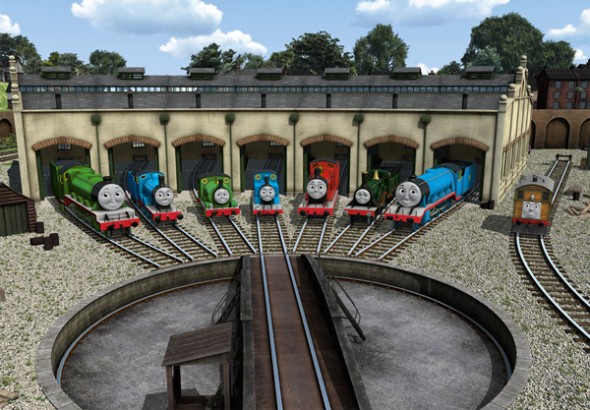
Little engines, in their sheds
Little engines, made of ticky-tacky
Little engines, in their sheds, little Engines, just the same
There’s a red one and a blue one, a pink one and a yellow one… Etc…
Anyway, I think what I find interesting about TtTE is that, arguably both the framing device (locomotion) and the subject matter (bureaucratic efficiency) are fairly antiquated relative to the world that my kids live in. And yet, somehow it manages to resonate at a profound level with so many kids.
Stokes: It’s interesting that the series emerged and became popular right around the time that steam engines were getting phased out — and although the Beeching Axe wasn’t until the mid 60s, the need for it was already pretty clear: in the late 1940s, relative to demand, Britain had way too many trains, lines, and stations. Most engines were NOT really useful.
There’s at least one case that I know of — Tobey — where Awdry based a character on a specific real-world train that was being decommissioned by British Rail for not being useful. Which makes Sodor sort of like whatever version of the ancient Greek afterlife involved getting turned into a constellation. Or maybe like the Valhalla of infrastructure.
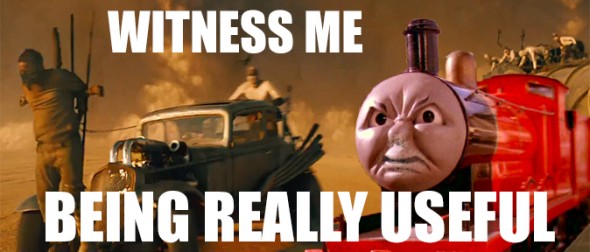
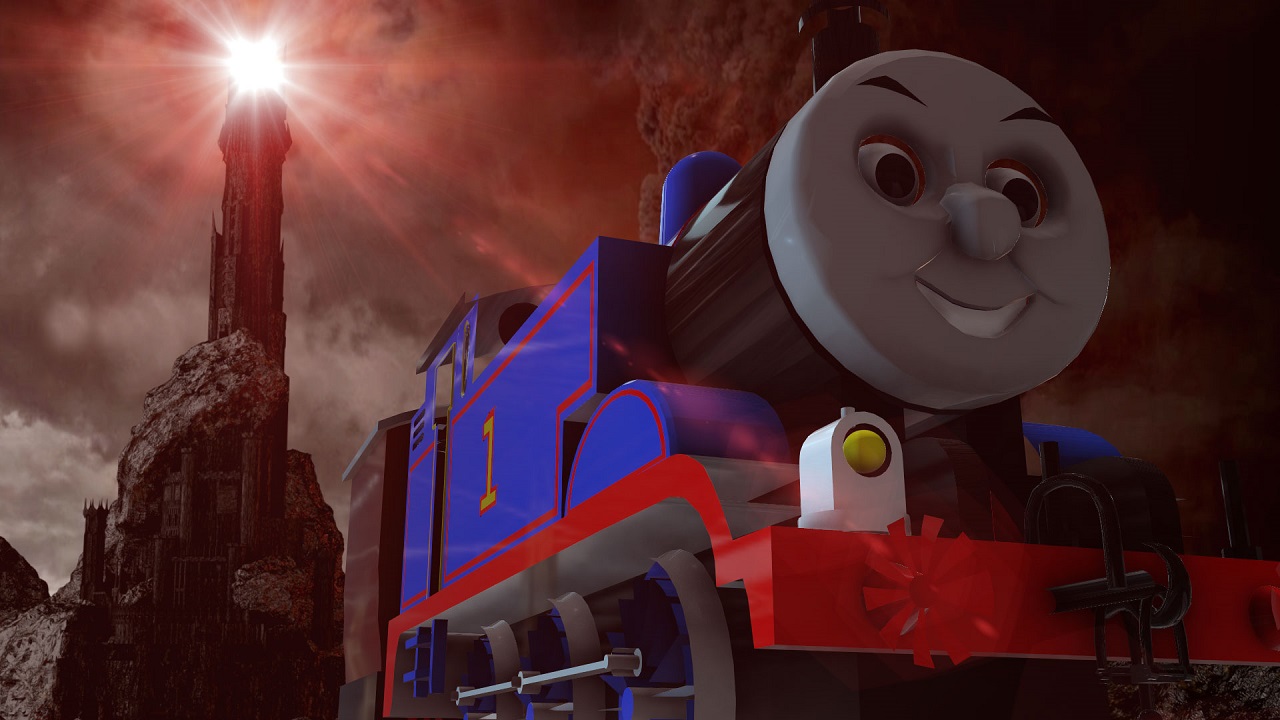
I imagine you may already be familiar with this article, since it went semi-viral a few years back when it was published, but you may be interested in the “Thomas the Tank Engine is Fascist” blog post. http://www.theguardian.com/commentisfree/2012/jul/04/tyrannical-world-thomas-the-tank-engine
Ayn Rand does not approve ascribing intelligence to machines:
“Have you ever looked for the root of production? Take a look at an electric generator and dare tell yourself that it was created by the muscular effort of unthinking brutes. Try to grow a seed of wheat without the knowledge left to you by men who had to discover it for the first time. Try to obtain your food by means of nothing but physical motions–and you’ll learn that man’s mind is the root of all the goods produced and of all the wealth that has ever existed on earth.”
Maybe Thomas is the star is because he is the underdog every-man proletariat. Because steam engines are no longer used, they function as a kind of historical fantasy—like a children’s steam punk.
works cited
http://capitalismmagazine.com/2002/08/franciscos-money-speech/
https://www.youtube.com/watch?v=wkivn_3zn5I&t=2m30s
Picard would say that the trains work ‘to better themselves.’ Richard already pointed out that the trains already have their basic needs met, so if your society is post scarcity, why even work? Because people keep moving the goal post. The Enterprise explores the final frontier because that is what is there to be explored. Trains move people and shunt cars because that is what is in front of them to do.
I don’t remember if Picard every deals with a labor strike, but I do recall he takes insubordination very seriously (especially if your insubordination involves your weapons officer picking sides in Klingon internal politics). Picard still does discipline his crew, like Toppham. One might still say that Picard’s authority comes from a monopoly on violence. Picard might be on a scientific mission, but if there’s a mutiny, the red shirts are behind him, and Picard has the security codes. He doesn’t ever threaten physical violence, but he may not even need to.
He also shames crews that act out of line, he just doesn’t do it in public. Toppham on the other hand sets up a reverse panopticon where everyone can see that Henry is in a brick prison “of his own design.”
I think both worlds are relatable to a certain kind of person because they both depict worlds where your value doesn’t come from navigating social hierarchies, but from simply loving what you are doing. The difference I think is that TNG crew are comfortable living in a world of ‘second bests,’ where they make due. They love what they do, but they know when they need to take responsibility and be an adult. The trains however have not yet (and will likely never learn to ) understand how to settle for less than what they have been promised because they are not comfortable with change.